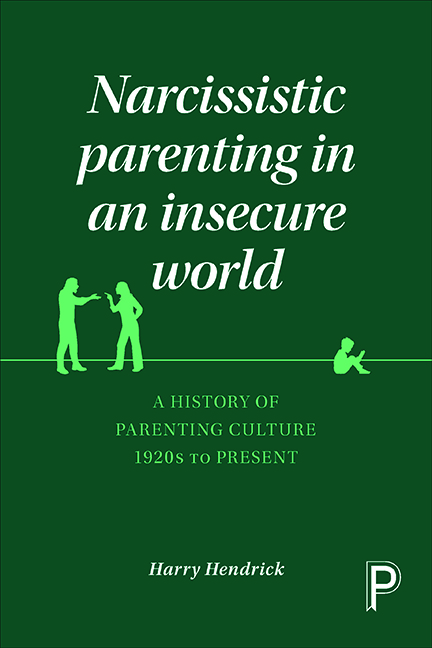Book contents
- Frontmatter
- Dedication
- Contents
- About the author
- Acknowledgements
- Introduction
- Part One The origins of social democracy’s family ideal: 1920s–1940s
- Part Two Characteristics of the ‘Golden Age’: 1940s–early 1970s
- Part Three Influences and examples from the USA
- Part Four Parental narcissism in neoliberal times: 1970s to the present
- Part Five Therapeutic reflections
- Index
nine - Narcissism and the ‘politics of recognition’: concepts of the late-modern self
Published online by Cambridge University Press: 05 April 2022
- Frontmatter
- Dedication
- Contents
- About the author
- Acknowledgements
- Introduction
- Part One The origins of social democracy’s family ideal: 1920s–1940s
- Part Two Characteristics of the ‘Golden Age’: 1940s–early 1970s
- Part Three Influences and examples from the USA
- Part Four Parental narcissism in neoliberal times: 1970s to the present
- Part Five Therapeutic reflections
- Index
Summary
I take my desires for reality, for I believe in the reality of my desires. (May 1968 graffiti)
A late-modern point of departure: the ‘postsocialist’ condition and the politics of redistribution/recognition
The work of the eminent feminist political philosopher Nancy Fraser regarding the ‘postsocialist’ condition and the politics of ‘redistribution or recognition’ is fairly well known, referring as it does to social and economic equality as a political goal and to claims for group differences, the rise of identity politics, and the decentring of class. Fraser worries that a revision has occurred in the way ‘in which justice is imagined… away from a socialist political imaginary, in which the central problem is redistribution’ to a position ‘where the central problem of justice is recognition’. The political imaginary is no longer that of ‘classes’ seeking to defend their ‘interests’, end ‘exploitation’, and win ‘redistribution’. Instead, ‘there are culturally defined “groups” or “communities of value” who are struggling to defend their “identities”, end “cultural domination”, and win “recognition”’. She reminds us of the critically important reality in which this shift has happened, namely ‘a resurgent economic liberalism’ that has become even more omnipresent since the 1980s. Redistribution was a term central in the political discourse of post-1945 ‘egalitarian liberalism’, as it strove to provide economic, social and political security for a social democracy. Issues relating to ‘questions of difference’, however, were sidelined, which was a mistake.
In their political–philosophical exchange, Fraser and Axel Honneth (a German philosopher who champions ‘recognition’ politics), agree that ‘Today the relation cries out for interrogation’ as ‘struggles over religion, nationality, and gender are now inter-imbricated in ways that make the question of recognition impossible to ignore’ At the same time, however, economic inequalities are growing under the impact of neoliberal forces promoting corporate globalisation and weakening the structures that previously enabled some degree of country-wide redistribution. Fraser and Honneth also agree that any valuable concept of justice must encompass both redistribution and recognition and that the latter cannot be seen as ‘a mere epiphenomenon’ of the former. Fraser proposes a ‘two-dimensional’ conception of justice that encompasses both objectives without reducing either one to the other, while also arguing for a distinction between the economic and the cultural.
- Type
- Chapter
- Information
- Narcissistic Parenting in an Insecure WorldA History of Parenting Culture 1920s to Present, pp. 301 - 322Publisher: Bristol University PressPrint publication year: 2016



